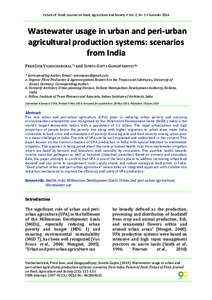| dc.date.accessioned | 2014-06-26T12:46:01Z | |
| dc.date.available | 2014-06-26T12:46:01Z | |
| dc.date.issued | 2014-06-10 | |
| dc.identifier.issn | 2197-411X | |
| dc.identifier.uri | urn:nbn:de:hebis:34-2014062645610 | |
| dc.identifier.uri | http://hdl.handle.net/123456789/2014062645610 | |
| dc.language.iso | eng | |
| dc.publisher | Department of Organic Food Quality and Food Culture at the University of Kassel, Germany and Federation of German Scientists (VDW) | eng |
| dc.rights | Urheberrechtlich geschützt | |
| dc.rights.uri | https://rightsstatements.org/page/InC/1.0/ | |
| dc.subject | Health risks | eng |
| dc.subject | Millennium Development Goals | eng |
| dc.subject | Urban and peri-urban agriculture | eng |
| dc.subject | Wastewater use | eng |
| dc.subject.ddc | 630 | |
| dc.title | Wastewater usage in urban and peri-urban agricultural production systems: scenarios from India | eng |
| dc.type | Aufsatz | |
| dcterms.abstract | The role urban and peri-urban agriculture (UPA) plays in reducing urban poverty and ensuring environmental sustainability was recognized by the Millennium Development Goals (MGDs). India is the world’s largest democratic nation with a population of 1.2 billion. The rapid urbanization and high proportion of people below the poverty line along with higher migration to urban areas make India vulnerable to food crisis and urbanization of poverty. Ensuring jobs and food security among urban poor is a major challenge in India. The role of UPA can be well explained and understood in this context. This paper focuses on the current situation of UPA production in India with special attention to wastewater irrigation. This question is being posed about the various human health risks from wastewater irrigation which are faced by farmers and labourers, and, secondly by consumers. The possible health hazards involve microbial pathogens as well as helminth (intestinal parasites). Based on primary and secondary data, this paper attempts to confirm that UPA is one of the best options to address increasing urban food demand and can serve to complement rural supply chains and reduce ecological food prints in India. “Good practice urban and peri-urban agriculture” necessitates an integrated approach with suitable risk reduction mechanisms to improve the efficiency and safety of UPA production. | eng |
| dcterms.accessRights | open access | |
| dcterms.bibliographicCitation | In: Future of Food: Journal on Food, Agriculture and Society. Witzenhausen : University of Kassel, Department of Organic Food Quality and Food Culture. - Vol. 2, No. 1 (2014), S. 111-133 | |
| dcterms.creator | Vazhacharickal, Prem Jose | |
| dcterms.creator | Gangopadhyay, Sumita Gupta | |

